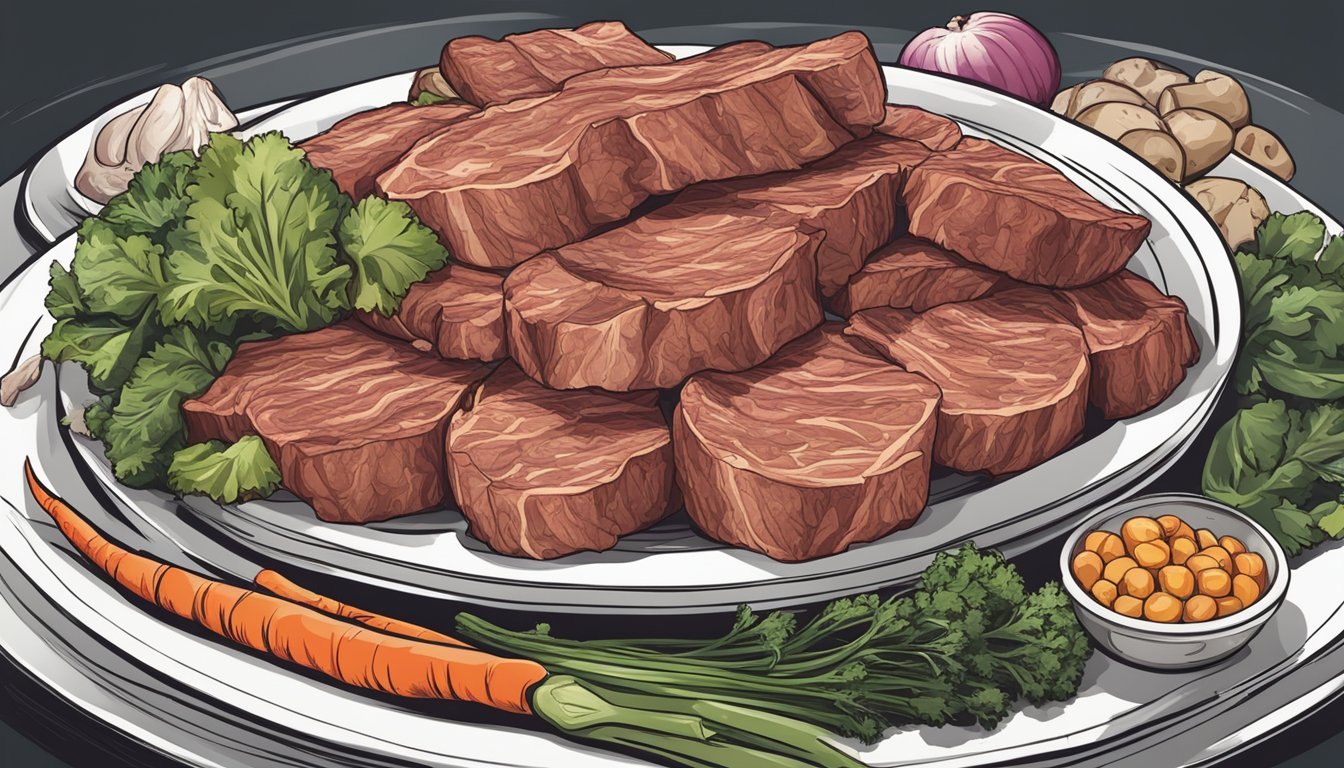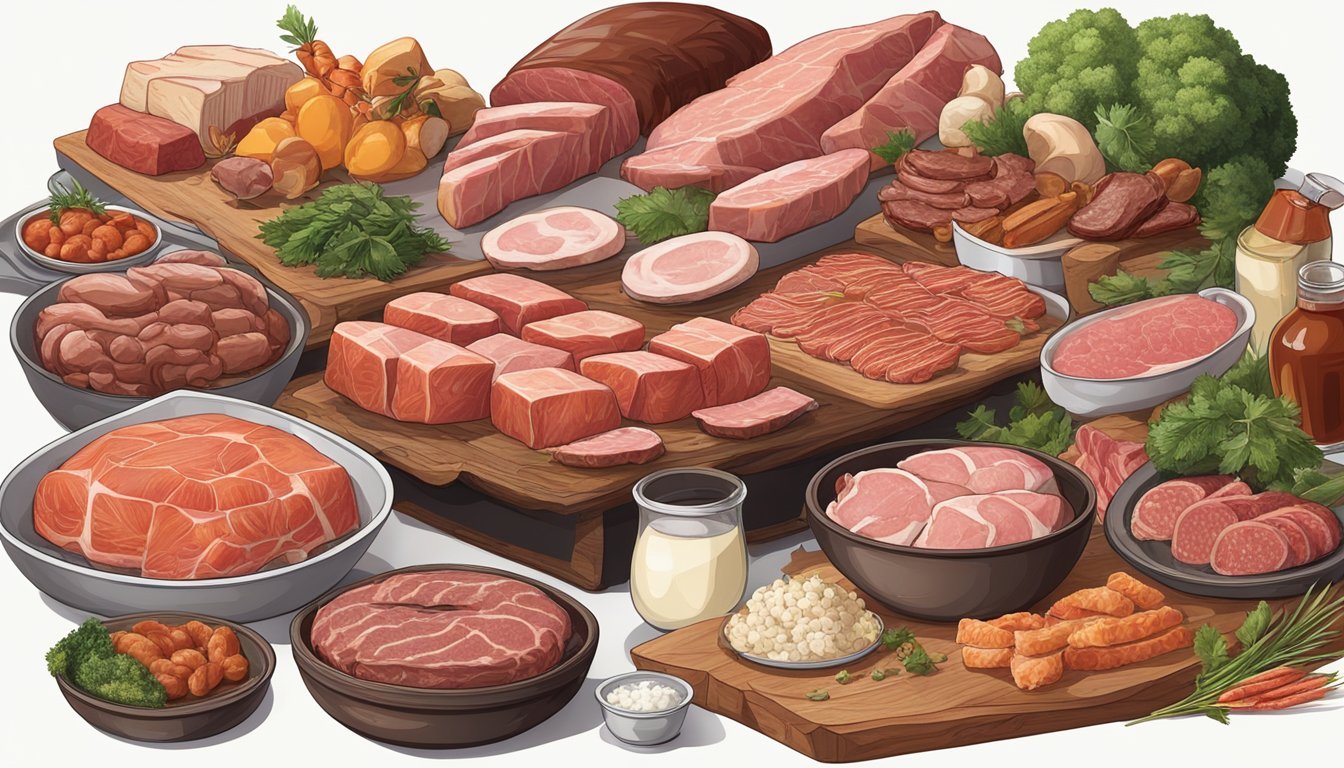Why No Vegetables on Carnivore Diet
Understanding Zero-Plant Nutrition
The carnivore diet is a regimented eating plan that centers exclusively on the consumption of animal products, eschewing the inclusion of vegetables. Advocates for this approach argue that a meat-centric diet provides all the necessary nutrients without the need for plant-based foods. Vegetables, although widely considered as staples for fiber and vitamins, are deliberately omitted due to the belief that meats can supply a sufficient spectrum of nutrients required for optimal health.
Proponents suggest that the absence of vegetables is justified by the presence of anti-nutrients in plant foods which may be detrimental to gut health and could exacerbate autoimmune conditions. Since the diet is rooted in the consumption of meat, eggs, and dairy, it assumes that the nutritional benefits of vegetables can be substituted by a careful selection of animal products. Those adhering to the carnivore diet often emphasize the importance of high-quality meats and avoid products that may be compromised by certain agricultural practices.
The diet's restrictive nature eliminates not just vegetables but also fruits, grains, legumes, nuts, and seeds, bringing it in stark contrast to conventional dietary guidelines. The rationale is embedded in a controversial standpoint that humans might not require plant foods to thrive and that a return to an animal-dominated diet could align more closely with certain historical and evolutionary dietary patterns.
Fundamentals of the Carnivore Diet
The Carnivore Diet strictly focuses on animal products and excludes plant-based foods. It posits that meats, dairy, and other animal-derived foods provide all the necessary nutrients for human health.
Philosophy and Principles
The Carnivore Diet is rooted in the belief that human bodies are optimized for consuming primarily animal products. Proponents argue that before the agricultural revolution, humans subsisted mainly on meats and fish, which shaped their nutritional needs. This diet assumes that plant foods are not essential for health and that certain plant compounds may cause inflammation or digestive issues in sensitive individuals.
Typical Foods Consumed
Individuals following the Carnivore Diet consume a variety of animal meats including beef, pork, chicken, and fish. The diet values organ meats for their nutrient density. Additionally, eggs and dairy products like milk, cheese, and heavy cream are often included for their high fat and protein content.
Examples of Animal Products
Meats
Examples: Beef, pork, chicken, fish, organ meats
Dairy
Examples: Milk, cheese, heavy cream
Other
Examples: Eggs
Foods to Avoid
The diet excludes all plant matter, therefore, vegetables, fruits, grains, legumes, nuts, and seeds are not consumed. The focus is on eliminating potential anti-nutrients and plant-derived substances that might disrupt gut health or cause autoimmune reactions.
Foods Not Consumed by Food Group
Vegetables
Not Consumed: All types
Fruits
Not Consumed: All types
Grains
Not Consumed: Wheat, rice, oats, etc.
Legumes
Not Consumed: Beans, lentils, peanuts, etc.
Nuts & Seeds
Not Consumed: Almonds, flaxseeds, etc.
This dietary approach emphasizes nutrition from animal products while strictly avoiding plant-based foods.
Health Implications
Exploring the health implications of a carnivore diet involves evaluating potential benefits and possible risks based on scientific research findings. One must consider the impacts on chronic diseases, nutrient intake, and overall well-being.
Potential Benefits
Weight Loss: Individuals on a carnivore diet may experience weight loss due to reduced calorie consumption and the satiating nature of high-protein foods.
Heart Disease: The diet may lead to changes in cholesterol levels, with some reports suggesting improvements in lipid profiles.
Autoimmune Conditions: Anecdotal evidence suggests that the reduction of plant-based foods could decrease inflammation and alleviate symptoms of autoimmune conditions.
Diabetes: A lower carbohydrate intake could help in managing blood sugar levels, potentially being beneficial for individuals with diabetes.
Possible Risks
Nutrient Deficiencies: Excluding vegetables may result in a lack of essential vitamins and minerals, raising concerns over long-term nutritional adequacy.
Heart Disease: There is a concern that high intake of saturated fats from animal products may contribute to higher cholesterol levels, a risk factor for heart disease.
Cancer: The absence of fiber, due to eliminating vegetables, may affect colon health and could potentially increase the risk of certain types of cancer.
Constipation: Without dietary fiber from vegetables, individuals might experience constipation.
Healthcare Provider Consultation: It's recommended to consult with a healthcare provider before adopting such a restrictive diet.
Scientific Research Findings
Research on the carnivore diet is limited. Most evidence currently comes from anecdotal reports and case studies. While some research points to potential health benefits like weight loss and improved symptoms of autoimmune conditions, other studies emphasize the risks of nutrient deficiencies and increased levels of LDL cholesterol, which may lead to heart disease or high blood pressure. More comprehensive and long-term studies are necessary to thoroughly assess the health implications of the carnivore diet.
Nutritional Considerations
In exploring the carnivore diet, one must evaluate how the exclusion of vegetables impacts a person's intake of macronutrients and micronutrients. The diet's focus on animal products affects not only nutrient content but also digestive health.
Macronutrients Blend
The carnivore diet provides protein and fat but virtually eliminates carbohydrates, as it consists of animal meats, organs, and sometimes dairy products. Protein is abundant and critical for body repair and muscle maintenance. Animal products are also rich in both saturated and unsaturated fat, which serve as a primary energy source on this diet. Carbohydrates are minimal to none, as vegetables and other plant-based sources of carbs are excluded.
Micronutrients Availability
Essential nutrients such as vitamins and minerals are traditionally sourced from both animal and plant foods. On the carnivore diet, certain vitamins like B12 and minerals like iron are readily available from meat. However, sourcing some micronutrients that are abundant in vegetables may require a strategic selection of animal products. Vitamin C and certain fatty acids, typically associated with fruits and vegetables, must be obtained through organ meats and seafood.
Digestive and Gut Health
Animal products lack dietary fiber, which can affect digestive issues and bowel movements. Advocates claim that fiber is not essential and that removing fibrous plants can alleviate gut irritation and improve gut health. However, it is important to note that fiber contributes to gut motility and the maintenance of healthy gut bacteria. An individual's response to a zero-fiber diet can vary, with some experiencing improvements in digestive comfort and others facing constipation or other issues.
Skip the lines and order your fiber supplement online for a stress-free shopping experience!
Addressing Nutrient Deficiencies
The risk of nutrient deficiencies on a carnivore diet includes vitamins and minerals commonly found in vegetables and fruits, such as vitamin E, A, K, and C, magnesium, and calcium. Dieters must be mindful to incorporate a variety of animal-based foods to cover their nutritional needs. Organ meats can be a key component as they often contain higher levels of these nutrients compared to muscle meats. Supplements may be necessary for some individuals to ensure a complete nutritional profile.
For the most extensive selection, I suggest buying vitamin E, vitamin A, vitamin K, vitamin C, magnesium, and calcium online!
The Role of Vegetables in Diet
Vegetables are integral to traditional diets due to their nutrient content, yet some diets exclude them based on concerns about anti-nutrients and potential inflammatory effects.
Nutritional Profile of Vegetables
Vegetables provide a vast spectrum of vitamins and minerals necessary for bodily functions. They are an essential source of dietary fiber, which supports digestive health. Many plant-based foods, such as fruits, vegetables, nuts, seeds, and grains, are rich in various nutrients. For example:
Leafy greens (like spinach and kale): High in vitamins A, C, K, and minerals like iron and calcium.
Cruciferous vegetables (like broccoli and Brussels sprouts): Contain fiber, vitamin C, and compounds like glucosinolates.
Legumes (like beans and lentils): Offer protein, fiber, B-complex vitamins, iron, and zinc.
Nutrients such as omega-3 fatty acids are found in nuts and seeds, and legumes contain isoflavones and resveratrol, which are believed to have health benefits.
Anti-Nutrients and Inflammatory Agents
While vegetables contain essential nutrients, they also contain substances termed anti-nutrients, which can interfere with nutrient absorption. These include:
Phytates: Found in grains and legumes, phytates can bind minerals and reduce their bioavailability.
Lectins: Present in legumes and nightshade vegetables, lectins are proteins that can be irritating to the gut lining and may cause inflammation.
Oxalates: Abundant in certain leafy greens, oxalates can bind to calcium and may contribute to kidney stone formation.
Some people argue that the presence of these chemicals may provoke inflammatory responses or contribute to health issues in susceptible individuals, leading them to adopt diets like the carnivore diet, which eliminates plant-based foods entirely.
Carnivore Diet and Lifestyle
The Carnivore Diet strictly involves consuming animal products only and excludes plant-based foods, resulting in a highly restrictive dietary regimen. It contrasts with balanced diets that incorporate a variety of food groups and requires careful daily meal planning to ensure nutritional needs are met through animal sources alone.
Daily Meal Planning
When planning daily meals on a carnivore diet, one focuses primarily on proteins and fats, essentially making it akin to a ketogenic diet plan but without the inclusion of most plant-based foods. A typical day might include:
Breakfast: Scrambled eggs and bacon.
Lunch: Chicken breasts with cheddar cheese.
Dinner: Organ meat pie or a steak.
Meals often consist of high-fat cuts of meat, offal, eggs, and sometimes dairy, to maintain satiety and energy levels.
Lifestyle and Activity Adjustments
Adopting the carnivore diet can necessitate several lifestyle and activity adjustments. Participants may notice changes in energy levels that could affect their fitness routines. Strength-focused exercises may benefit from the high-protein intake, while endurance activities could require adaptation to the diet's limited glycogen stores. It's essential for individuals to monitor their body's responses closely and adjust their activity levels accordingly.
Social and Cultural Considerations
Those who adhere to a carnivore diet often face social challenges, such as limited food options at social gatherings or having to explain their dietary choices. Culture plays a significant role in dietary habits, and a carnivore diet may diverge considerably from traditional eating patterns, requiring adjustments not just personally, but socially as well. Individuals must navigate the potential impact on relationships and social situations while upholding their dietary convictions.
The carnivore lifestyle emphasizes discipline and a substantial focus on animal-based foods, which differs markedly from a balanced diet approach. Its impact on one's well-being is subjective, and it's crucial for individuals to consider their health and lifestyle needs when evaluating such a restrictive diet regimen.
Comparison to Other Diets
The Carnivore Diet stands out for its exclusion of plant-based foods, contrasting with other diets that typically incorporate a variety of food groups. It's distinct in both its approach to carbohydrates and its elimination of fiber-rich fruits and vegetables.
Carnivore vs. Keto
Carbohydrate Intake: Both the Carnivore and Ketogenic (keto) diets are low in carbohydrates. However, the Carnivore Diet often results in even lower carb intake since it excludes all plant-based foods, while the keto diet allows for a moderate consumption of vegetables and limited fruits primarily for fiber and micronutrient intake.
Fat and Protein: Keto emphasizes a high-fat, moderate-protein, low-carb macronutrient distribution to induce ketosis. In contrast, the Carnivore Diet is high in both protein and fat due to its reliance on animal products, but ketosis is not the primary goal.
Carnivore vs. Paleo
Food Variety: The Paleo diet includes lean meats, fish, fruits, vegetables, nuts, and seeds—foods that could have been obtained by hunting and gathering. The Carnivore Diet, on the other hand, exclusively allows animal products and excludes all plant-based foods.
Dairy Products: Paleo generally avoids dairy products, which are considered a product of agricultural practices. Conversely, the Carnivore Diet often incorporates dairy, particularly high-fat options like cheese and butter, as part of its animal product allowance.
Carnivore vs. Plant-Based
Fundamental Philosophy: The Plant-Based diet emphasizes fruits, vegetables, legumes, seeds, and whole grains, aiming for a high intake of fiber and diverse micronutrients. The Carnivore Diet, in stark contrast, eliminates these food groups entirely, focusing instead on animal-based proteins and fats.
Nutrient Sources: While plant-based diets get nutrients from a variety of foods, the Carnivore Diet seeks to obtain necessary vitamins and minerals solely from animal products, arguing that this can cover nutritional needs without the anti-nutrients found in some plant-based foods.
Practical Tips for Beginners
Transitioning to a carnivore diet requires guidance, discipline, and adaptability. This section provides newcomers with concrete strategies to make the dietary shift, navigate cravings and social scenarios, and emphasizes the importance of consulting healthcare providers.
Transitioning to Carnivore
When someone first switches to a carnivore diet, they should focus on simplicity and quality. They can start by prioritizing high-quality animal-based foods such as grass-fed beef, free-range poultry, and wild-caught fish. Beginners are advised to ease into the diet by gradually reducing plant matter and increasing their intake of meats, eggs, and dairy. Hydration is also vital, and they should ensure they drink plenty of water throughout the transition.
Week 1: Reduce plant-based foods by 50%.
Week 2-3: Limit plant-based foods to one meal a day.
Week 4: Fully transition to animal-based foods.
Managing Cravings and Social Events
Handling cravings can be challenging, but a person can curb them by having satisfying carnivore diet snacks on hand, such as boiled eggs or jerky. When attending social events, they can choose to eat beforehand or bring their own carnivore-friendly options. Clear communication with hosts can also ease the process, helping to ensure that there are suitable food options available.
Curbing Cravings: Keep satiating, protein-rich snacks readily accessible.
Navigating Social Events:
Eat a carnivore meal prior to the event.
Discuss dietary needs with the event host in advance.
Consulting with Healthcare Providers
Before starting any drastic dietary change, individuals should consult with a healthcare provider, especially if they have existing health conditions. The provider can offer advice on how to monitor health and nutritional status throughout the diet. Regular check-ups can help track the impact of the diet change and adjust it if necessary.
Initial Consultation: Discuss current health status and dietary goals.
Schedule regular follow-up appointments.
Perform necessary lab tests to monitor health metrics.
Personal Stories and Case Studies
The individual experiences with the carnivore diet often highlight varied outcomes, particularly regarding well-being, body weight, and energy levels. These narratives offer insight into the diet's impact and the strategies used to manage challenges.
Success Stories
Shawn Baker, an orthopedic surgeon, is one of the most vocal proponents of the carnivore diet. His claims of enhanced well-being and athletic performance have played a significant role in popularizing this dietary approach. Baker reports that he has been able to maintain his body weight and improve his overall energy levels on this diet.
Others, who have adopted the carnivore diet, share stories of how they managed to lose weight, often after struggling with other diet plans. A common thread in these testimonials is the reported increase in satiety and a decrease in cravings, which they attribute to the high protein content of the diet.
Challenges and How They Were Overcome
Challenges faced by individuals on the carnivore diet often relate to social situations and the initial adjustment period. Some have reported flu-like symptoms when transitioning to the diet, which is sometimes referred to as "keto flu," characterized by fatigue and headaches. Individuals have overcome these issues by ensuring adequate hydration and, in some cases, supplementing with electrolytes.
Socially, adherents have found it challenging to navigate dining out or attending events due to the restrictive nature of the diet. Strategies to overcome these challenges include preparing by eating ahead, selecting carnivore-friendly options like steak or seafood when dining out, or bringing their own meals when necessary.
Conclusion
The carnivore diet, characterized by an exclusive consumption of animal products, inherently omits vegetables. Advocates claim health benefits such as improved gut health and relief from autoimmune symptoms, emphasizing that animal products provide essential nutrients without the need for plant-based foods.
Sustainability concerns arise with the carnivore diet, given that it relies heavily on animal agriculture; a sector known for its significant environmental footprint. Proponents might argue for the potential of sustainable farming practices, but evidence-based research into this aspect of the carnivore diet is still evolving.
Health considerations with an all-meat diet include the debate on whether the exclusion of vegetables, and therefore dietary fiber and certain vitamins, might pose long-term risks. The diet's alignment with human evolutionary eating patterns is often cited to counter these concerns, though peer-reviewed research is limited.
Research into the carnivore diet is ongoing, with future directions aimed at establishing its long-term impact on health. Nutritional science often emphasizes a balanced diet, including vegetables for fiber and micronutrients, but the carnivore diet challenges this paradigm by illustrating an alternative that some find beneficial.
In summary, while the carnivore diet excludes vegetables based on its foundational beliefs and claimed health benefits, considerations for sustainability and comprehensive health effects call for further empirical research. It remains a diet with polarizing views in the nutritional community, meriting attention for its contrarian stance on vegetables.















